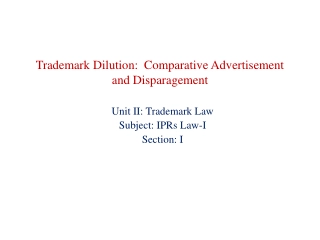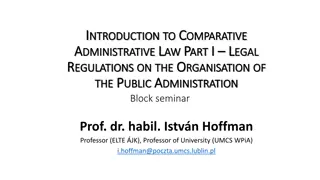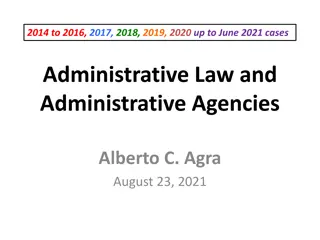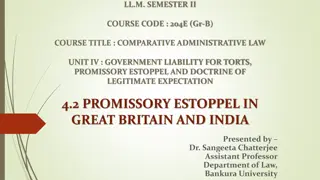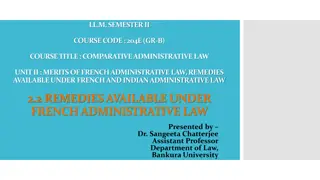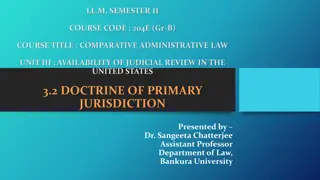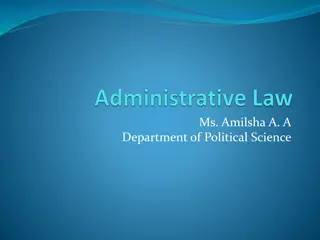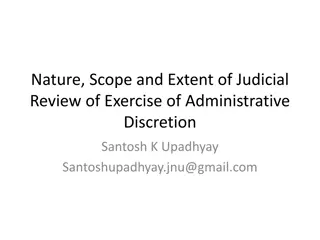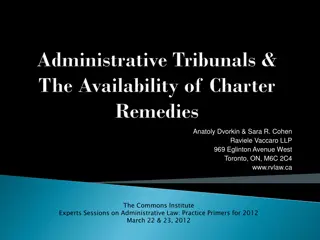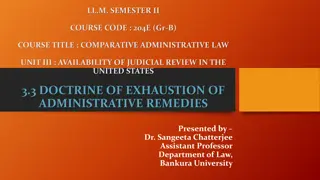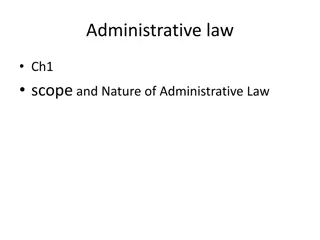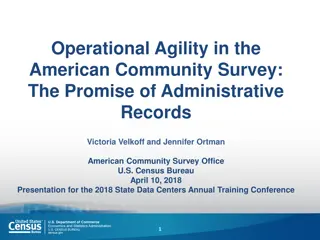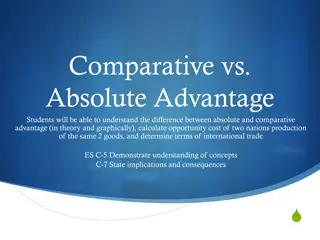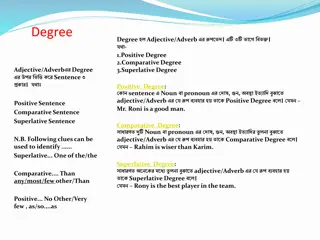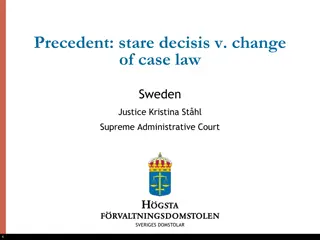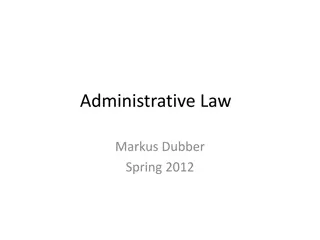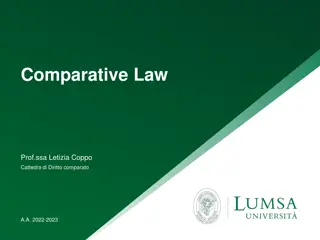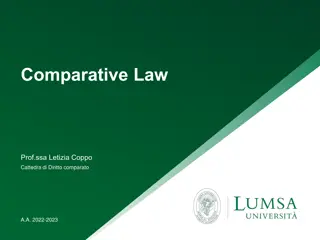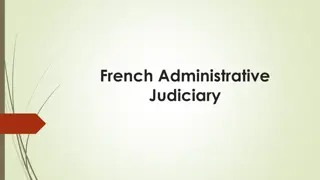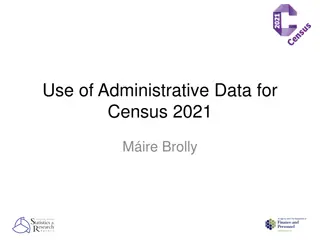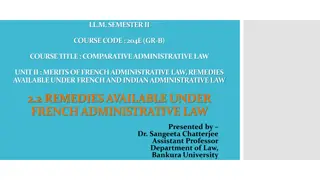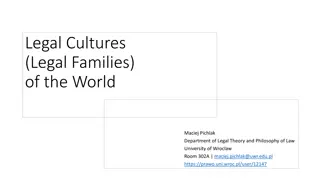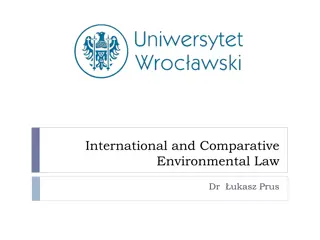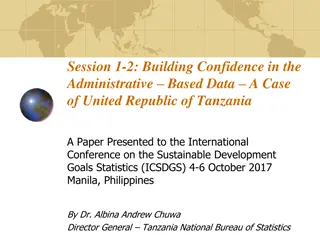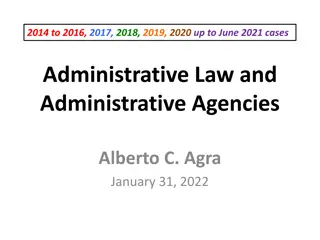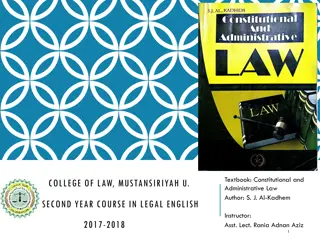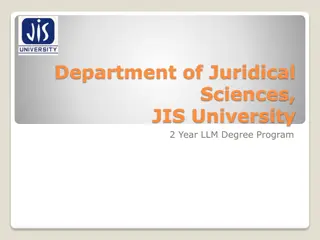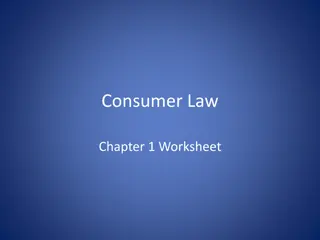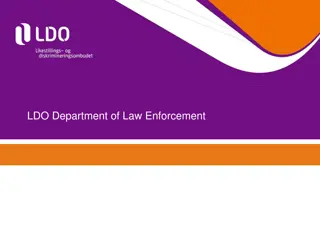Trademark Dilution and Comparative Advertisement
Trademark dilution and comparative advertisement in trademark law. Understand the grounds for trademark infringement and the elements needed to establish dilution or disparagement. Explore the importance of protecting registered trademarks and the limitations of comparative advertisement.
0 views • 6 slides
Comparative Sociology
Comparative Sociology is a specialized branch that compares societies to provide generalizations, focusing on the structure and jurisdiction of groups and organizations. It involves studying affinities and disparities to predict outcomes. The discipline is closely related to Social Anthropology. Com
3 views • 15 slides
Comparative Analysis of Administrative Law Regulations in Public Administration
This block seminar delves into the realm of administrative law regulations, exploring topics such as the concept of Love Law, different legal approaches, pluralism in Roman law, modern pluralism, challenges of comparison, levels of comparison, and methods of legal comparison. The discussion includes
0 views • 83 slides
Overview of Administrative Law and Agencies in 2014-2021
This content provides an in-depth look at Administrative Law and Administrative Agencies from 2014 to June 2021. It covers the definition of Administrative Law, classifications, the role of Administrative Agencies, their creation, and examples of governing bodies. The material delves into the powers
1 views • 74 slides
Understanding Promissory Estoppel in Comparative Administrative Law
Estoppel and specifically Promissory Estoppel have evolved as important legal doctrines to prevent injustice and ensure that promises made are upheld. This concept is explored in the context of administrative law, particularly looking at government liability for torts, the doctrine of legitimate exp
0 views • 12 slides
The Ecological Approach in Comparative Public Administration
Fred W. Riggs, a proponent of the Ecological Approach in Public Administration, emphasized the importance of understanding the interaction between administrative systems and their external surroundings. He introduced the Fused-Prismatic-Diffracted Model to explore the unique contexts of developing c
0 views • 21 slides
Comparative Administrative Law: Remedies in French Administrative Law
The administrative justice system in France has evolved over the years, with various remedies available to challenge the lawfulness of administrative acts. The remedies are classified into formal and material categories based on historical developments and legal principles. Citizens can seek redress
1 views • 8 slides
Understanding Doctrine of Primary Jurisdiction in Comparative Administrative Law
The doctrine of primary jurisdiction plays a crucial role in determining whether a court should yield to an administrative agency for certain issues. It helps in deciding which tribunal should take the initial action, especially in cases involving administrative discretion. This doctrine allows cour
1 views • 14 slides
Understanding Administrative Law: Definitions and Perspectives
Administrative Law encompasses principles governing public administration, delineating official powers, responsibilities, and remedies for rights violations. Explore insights from notable figures like Barthelemy, Ivor Jennings, and Dicey regarding administrative law's breadth, structure, and applica
0 views • 10 slides
Understanding Judicial Review of Administrative Discretion
Judicial review of administrative discretion aims to ensure that public authorities act within the bounds of their statutory powers and in the public interest. Courts do not act as appellate bodies but review decisions to ascertain proper consideration of relevant facts and absence of extraneous inf
0 views • 9 slides
Understanding Tribunals, Charter Rights, and Remedies in Canadian Administrative Law
Exploring the implications of Section 52(1) of the Constitution Act and Section 24(1) of the Charter on administrative law in Canada. Discussing how tribunals handle potential constitutional issues, provide personal remedies, and analyze the impacts of legal decisions. Dive into the complexities of
1 views • 29 slides
Doctrine of Exhaustion of Administrative Remedies in Comparative Administrative Law
The doctrine of exhaustion of administrative remedies requires litigants to pursue all available remedies with administrative authorities before seeking judicial review. Originating from the case of Myers v. Bethlehem Shipbuilding Corp, this doctrine aims to respect congressional intent and promote
1 views • 12 slides
Understanding Administrative Law: Scope and Nature
Administrative law is a branch of public law that governs the relationship between the state and its citizens, regulating how power is exercised by the executive branch and administrative agencies. It sets legal limits to ensure protection against abuse of power and arbitrariness, focusing on the or
0 views • 26 slides
Enhancing Data Quality through Administrative Records in American Community Survey
This presentation discusses the potential of using administrative records to improve data quality and reduce respondent burden in the American Community Survey. It explores key priorities, research findings, data source evaluation, and the process of simulating housing estimates using administrative
0 views • 19 slides
Understanding Comparative and Absolute Advantage in International Trade
Understand the concepts of absolute and comparative advantage through theory, graphical illustrations, and opportunity cost calculations for two nations. Explore the implications and consequences of these concepts in terms of international trade. Specialization, division of tasks, and gains from tra
0 views • 15 slides
Understanding Degrees of Adjectives and Adverbs
This content explains the concept of positive, comparative, and superlative degrees of adjectives and adverbs in English grammar. It provides rules and examples for transforming positive into superlative, positive into comparative, comparative into positive, comparative into superlative, and more.
0 views • 8 slides
Overview of UK Law: Statute Law, Common Law, Criminal Law, Civil Law
Statute Law is written law created through the parliamentary process, forming the basis of the legal system. Common Law, on the other hand, is unwritten law based on judicial decisions and precedents. They govern different aspects such as civil and criminal matters, each with its unique characterist
0 views • 15 slides
Understanding Precedents in the Swedish Court System
The Swedish court system comprises general courts for criminal and private law, and administrative courts for tax and administrative law. The Supreme Administrative Court plays a key role in setting precedents, with about 8000 cases appealed each year. Precedents from the court are influential, even
0 views • 8 slides
Administrative Law and Refugee Protection Guidelines Analysis
Analysis of refugee protection guidelines and procedural fairness in administrative law, focusing on issues related to fear of persecution, credibility assessment, and hearing procedures before the Refugee Protection Division. The discussion also highlights the roles and powers of different members
0 views • 10 slides
Comparative Law: Research, Analysis, and Resources
Explore the world of comparative law through research and study of legal systems, including Italian and foreign laws. Delve into comparative legal analysis, characteristics of legal systems, and the study of legal sources. Discover in-depth insights from a variety of books and academic journals, as
0 views • 36 slides
Understanding Globalization, Trade, and Comparative Advantage in Economics
Globalization and trade play a crucial role in the interconnected world economy. This module explores the gains from international trade, barriers to trade, costs of globalization, and the concepts of absolute and comparative advantage. Absolute advantage is when a country can produce a good using f
0 views • 27 slides
Understanding Comparative Property Law in the Contemporary Legal Landscape
Comparative Property Law explores the common challenges and fundamental questions of contemporary tort law, covering topics such as tort liability, legal positions protected by tort law, criteria for attributing liability, compensatory, deterrence, and punitive functions of tort law, and more. The i
0 views • 37 slides
Understanding Comparative Advantage and Gains from Trade
In this lecture on comparative advantage and gains from trade, the concept of why countries trade, price differences, supply and demand, the Ricardian model of trade, identifying comparative advantage, and critiques of comparative advantage are discussed. The benefits of free trade and how it leads
0 views • 53 slides
Comparative Law Course Overview for A.Y. 2022-2023 by Prof.ssa Letizia Coppo
Dive into the world of comparative law with Prof.ssa Letizia Coppo in the academic year 2022-2023. The course covers key legal systems worldwide, including Western, Eastern, and religion-based traditions. Explore the impact of technological and digital revolutions on global law, legal transplants, u
0 views • 34 slides
Evolution of the French Administrative Judiciary System
Explore the rich historical development of the French Administrative Judiciary system from the pre-revolutionary period to modern times. Learn about key events such as the French Revolution, the creation of specialized courts, and the types of disputes handled by the administrative judiciary. Discov
0 views • 27 slides
Classification of Law: Understanding Different Types and Functions
Exploring the classification of law is essential for understanding the diverse nature of legal systems. This overview delves into domestic law vs. public international law, public law vs. private law, and the sub-divisions within public law, such as constitutional, administrative, and criminal law.
0 views • 19 slides
Utilizing Administrative Data for Census 2021: Insights and Strategies
Providing a comprehensive overview of the historical use of administrative data for census purposes, this content delves into methodologies adopted in previous censuses, such as hand-delivery, online attempts, and administrative data enrichment. It also outlines plans for the 2021 census, focusing o
0 views • 19 slides
Comparative Administrative Law in France: Remedies Available under French Administrative Law
The administrative justice system in France has evolved over the years, balancing classicism and uniqueness. Various remedies are available before the administrative court to challenge the lawfulness of acts adopted by the administration or assert rights against it. Two main classifications of remed
0 views • 8 slides
Overview of Legal Systems and Roman Law Development
Legal systems play a crucial role in governing societies, with Roman Law, Common Law, Civil Law, and Religious Law being some of the major types worldwide. Roman Law, focusing on private law, has influenced legal traditions in various regions, especially in Europe. Contrasting Common Law and Civil L
0 views • 26 slides
Comparative Analysis of Legal Families Around the World
Explore the diverse legal cultures and families existing globally, including Civil Law, Common Law, Far East, Islamic, Hindu, and more. Learn about the historical background, methods of reasoning, institutions, sources of law, and dominant ideologies that characterize each legal family. Delve into t
0 views • 17 slides
Enhancing Leasing Success with Administrative Fee Utilization
This webinar focuses on utilizing administrative fees to improve leasing success in the HCV program. It covers topics such as funding determination, best practices in administrative fee usage, and permissible uses of administrative fee funding. Participants can learn about how administrative fees ar
0 views • 29 slides
Comparative and International Environmental Law Course Overview
Explore the world of Comparative and International Environmental Law with Dr. ukasz Prus through in-depth examinations, take-home exams, and insightful discussions on topics such as environmental policy, law sources, and regional systems. Dive into the complexities of waste management, common legal
0 views • 102 slides
New Global Developments in Comparative Politics Since the 1980s
The lecture by Dr. Maame Adwoa A. Gyekye-Jandoh explores new global developments in Comparative Politics since the 1980s, covering topics like rapid industrialization in Asia and the collapse of communism in the Soviet Union and Eastern Europe. Students are introduced to key concepts such as the Com
0 views • 20 slides
Challenges and Opportunities in Building Confidence with Administrative Data
This paper discusses the challenges and opportunities in building confidence with administrative-based data, focusing on the case of the United Republic of Tanzania. It covers topics such as the background of administrative data, fundamental principles of official statistics, legal aspects, incomple
0 views • 19 slides
Understanding Administrative Law and Administrative Agencies: A Comprehensive Overview
Administrative law encompasses the regulations governing government administrative agencies, outlining their organization and operations. This includes classifications, roles of administrative agencies, creation process, and examples of creating authorities like Congress, the President, and the Supr
0 views • 75 slides
Comparative Study of Law Enforcement and Military Efforts in Homeland Security
This comparative study delves into the perceived militarization of American law enforcement and its implications for homeland security efforts. It explores differing missions, approaches, government forms, threats, and efforts to minimize militarization, highlighting the blurring line between milita
0 views • 23 slides
Constitutional and Administrative Law Course at College of Law, Mustansiriyah University
Second-year students at the College of Law, Mustansiriyah University, are studying Constitutional and Administrative Law for the academic year 2017-2018. The course covers topics such as the sources of Constitutional Law, including Legislation, Judicial Interpretation, and Conventions. Asst. Lect. R
0 views • 6 slides
2-Year LLM Degree Program in Juridical Sciences at JIS University
Explore the 2-year LLM degree program offered by the Department of Juridical Sciences at JIS University, specializing in Corporate Law, Criminal Law, and Constitutional Law. The program covers a range of specializations such as Comparative Criminal Law, Human Rights, Corporate Law, Competition Law,
0 views • 7 slides
Understanding Consumer Law: Enactment and Application of Laws
This comprehensive worksheet delves into the different types of laws such as Constitutional Law, Statutory Law, Administrative Law, Case Law, and Ordinances. It provides insights on who enacts these laws and explores scenarios to determine the type of law that would likely apply. Enrich your knowled
0 views • 19 slides
Understanding the Administrative and Legal Framework of the Department of Law Enforcement
Administrative body like the LDO Department of Law Enforcement deals with complaints outside of courts, offering legal guidance, amicable solutions, and handling appeals without direct court involvement. The Anti-Discrimination Tribunal, a key entity, has powers to issue binding administrative decis
0 views • 7 slides
